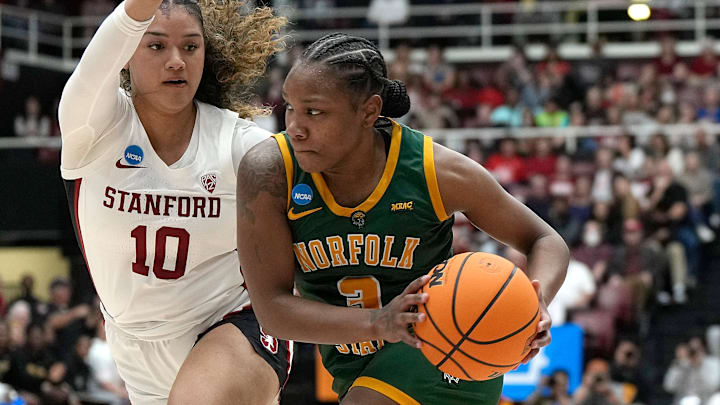The 2025 WNBA Draft has come and gone, now 30+ young women will spend the next few weeks hoping to end up on their teams' final roster.
As many WNBA fans know, that's not an easy feat. It's already difficult to get drafted at all, and a lot of talented players didn't make the cut. For those who did, the next few weeks will be filled with enormous highs and likely deep lows. While the league is taking several steps to address this ongoing problem (such as launching expansion teams), it still stands that fewer than 50% of the 2024 draft class was signed to a WNBA roster when the season began.
Some of those who are ultimately waived will end up playing overseas or hoping to be picked up by Unrivaled or AU Pro Basketball next year. But what about the players who were on the cusp of being drafted, but who weren't simply because there aren't enough spots?
Some undrafted players will sign training camp contracts
Going undrafted means a player is now a free agent — and that means she still has options. Some players will sign training camp contracts, the very same contracts rookies are signed to until the season begins. In easy terms, a training camp contract is a non-standard contract that is only valid before the season starts and that doesn't take away from a team's overall cap space. But there's a catch: if the team hasn't signed a player by the team the season begins, the contract is null. If a player is signed, the contract automatically becomes a standard contract at the league minimum.
Plenty of players have already signed training camp contracts, a process that began almost as soon as the draft was finished Monday night. These players include Sammie Puisis and Tilly Boler (who both signed to the Chicago Sky) as well as Ajae Petty and Reigan Richardson (Minnesota Lynx).
But not every player who deserves to attend training camp will be offered the chance to... and there are other options on the table.
A lot of undrafted basketball players end up playing overseas
The phrase "overseas basketball" is tossed around a lot but not always easily understood. The most important thing any player can understand about playing overseas is that it's a professional job and should be treated as such. Outside of a player's stats and skills, what happened in college — NIL deals, ESPN shoutouts, chartered flights — don't matter anymore. Like a lot of professional jobs, there's a lot of people vying for the same spot, and expecting everything to be like college is a mistake that can carry a heavy price.
The second thing to understand is that the right agent can do a lot in terms of helping an athlete, but the wrong agent can set you back one or more seasons. And while there is plenty of money to be made overseas, most athletes are not going to command millions (unless you're Diana Taurasi) — in fact, most athletes will be lucky to command thousands.
The term "overseas" can also be misleading for athletes and for fans. The reality is that there are dozens of countries an athlete could play for, and within those countries, a lot of leagues that all compete at varying levels. Ideally, any athlete who might even consider playing overseas should being learning about the process, the teams, the cultures, and agents long before graduation.
The level of play in the WNBA is superior to any overseas team in the world, but there are overseas teams that can offer a lot in other ways. Competition is typically similar to what a lot of athletes experience in college, which means a lot of athletes can use their time overseas to develop (and maybe even get drafted into the WNBA next year).
